Do you have a local business, that attracts customers, and wants to improve your digital local visibility?
Nowadays, 76% of customers are looking for local outlets (as per Bizcaboom’s research) to purchase products, services, or information, making Local Search Engine Optimization more valuable, and beneficial for business owners.
To help you improve your local search presence for your target city, we have conducted a beginner-friendly local Search Engine Optimization (Local SEO) guide, which will help you improve your digital business locally.
What is Local SEO?
Local SEO is the process of optimizing your online business for single or multiple locations, to improve brand awareness, visibility, and local traffic.
The main benefit of Local SEO is to provide a better user experience and increase the presence of your business by targeting target audiences in the same geographical area.
While some physical location stores do not receive many customers, their online presence can change things, as most searches are done locally.
A person performs a local search before visiting any outlet. The main goal of the searcher is to find any local business within 5 miles of their current location.
How Local SEO Works
Local SEO can be done by optimizing your website for locally searched queries, which signal search engines, that your website is located in a certain area. When done properly, a local business can rank for multiple location keywords, especially for phrases including “near me”.
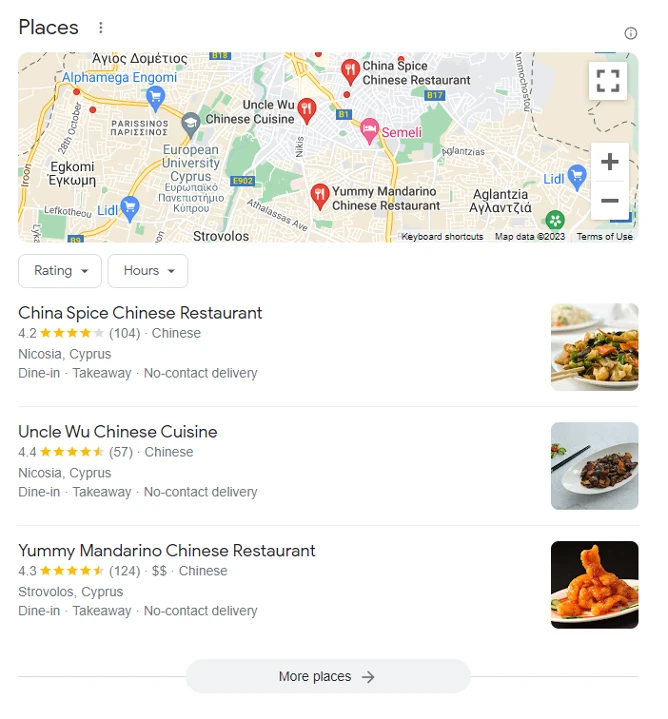
For a search engine, it is important to showcase results based on three different factors, along with their typical ranking factors, and weight calculations.
These three local SEO ranking factors are:
1. Relevance – Calculated depending on how close the result is to the query provided to search engines.
2. Distance – The distance between the searcher, and the physical location of the outlet. Depending on relevancy Google tries to display the most relevant locations, based on the first local ranking factor.
3. Prominence – How helpful business is compared to competitors and their Google Profile Business pages.
Based on the three local ranking factors mentioned, Google and other search engines can display the most relevant local search results to searchers.
However, a search engine can display local search results without having the location, or “near me” term applied.
The reason for this would be the intent of the search performed. Search engines can understand the reason behind the search, and aim to provide the most accurate answers, whether they are in the form of basic search results combined with a special “Places” section.
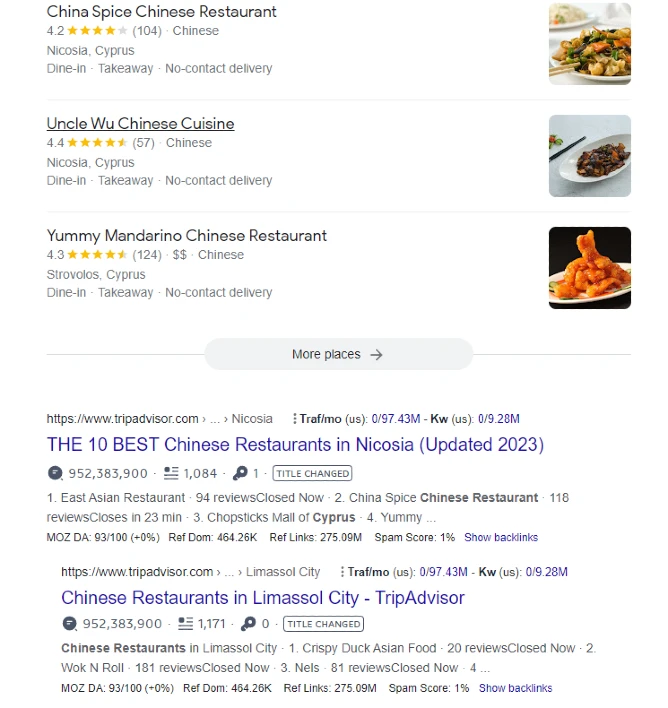
This section is introduced as a “local pack”. It contains local places along with a map, with all locations relevant to your search pinned.
Each of these listings has been shown, depending on the three local factors, and optimization on the Google Business Profile.
Searching for “tech store” on Google provides us with 3 different results. The first is from Google’s new update, which displays social media pages, and helpful listicle posts.
Under it, we have the local pack, containing a map with pinned results, and Google listings.
As you can see in the results section, each of the businesses presented has a target location, proving to Google that the business is relevant to the query, making it a perfect fit for searchers.
Nonetheless, these businesses can perform local SEO without a website.
Why Local SEO is Important?
For physical or upcoming businesses, local SEO can be very important due to becoming visible for local search results. Appearing for locally searched terms can improve the existence, and strengthen the brand of a business, bringing more foot traffic, and increasing sales.
Local SEO also comes with some benefits, which can make a local business more powerful, and preferred by local customers.
1. Lower competition in local searches
When starting a local business, you will be removing a big portion of global leaders, lowering your competition, and giving you bigger chances of ranking within a local search.
Local searches are a bit different from global ones, and only the ones that target the same local areas will compete.
By using a local SEO tool you can easily find hundreds of potential keywords, which target your area and have a good number of monthly searches.

These keywords will not have a large difficulty, except, if you are in a competitive niche, but that shouldn’t stop you, because you can still research local keywords with low difficulty, and rank them.
2. Helps to scale your business for multiple locations
A local store can easily scale for multiple location SEO, once the main location has been filled up, and popularity has increased.
Multiple-location businesses can easily target more areas and find more customers from their target audience, by providing a physical location for their next area.
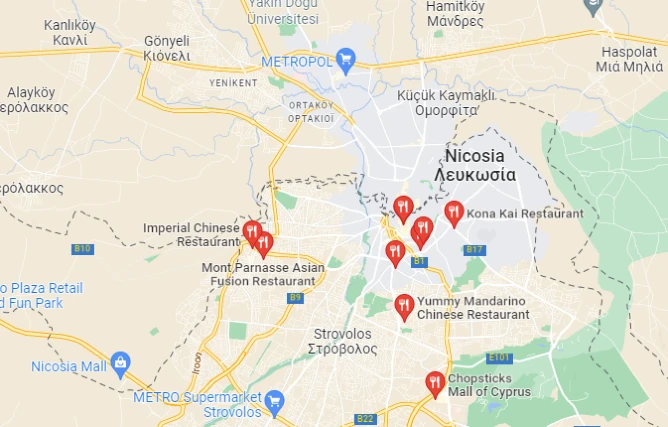
3. Have their location placed on maps
Going digital has many benefits, especially for local businesses. One of the main reasons a business goes digital is due to being placed on maps.
Local area residents often perform searches for outlets near their physical location and will visit the place if it’s located near them.
On top of that 37% of these local searchers tend to visit the website of the local outlet, they had previously located through maps, and make a purchase.
4. Get promoted by influencers or podcasters
For business owners, promotion is one of the hardest, but most rewarding ways to increase brand awareness, and receive more customers.
Most local businesses are often visited by influencers, or even podcasters, who are actively searching for a new story or product to promote while performing their activities.
If your business has the quality and meets their standards, receiving a free promotion could be beneficial, and bring your happy customers, who are ready to purchase the same product, that was promoted.
Tips on Improving Your Local Search Presence
Improving your local search presence can be a hard task for new business owners. It requires planning and covering the basics, to only appear for searches, which doesn’t guarantee high rankings.
To start with your local business SEO strategy, the most important thing is improving the on-page and off-page SEO factors.
Research local keywords
To compete for locally searched keywords, you will need to choose your target audience and have a keyword research tool. With SEO tools, a business owner can conduct a small research on how many times a local area keyword is used, and what is the difficulty to rank for that term.
Optimizing your content for that keyword will notify search engines that you are targeting a specific location, giving you the chance to rank higher in the SERPs.
With local SEO tools, you can make a list of hundreds of keywords, rank for more terms, and appear more frequently for local search terms.
If you are not sure what keywords to use and target, the easiest way would be to spy on your competitors.
Taking your competitor’s URL, and placing it in any SEO tool, should give you a brief idea of what keywords your competitors are currently ranking for.

Make 3 lists of such keywords, and try to group them into topically relevant words, to boost your local SEO strategy, and outrank the competition.
Add local keywords to titles, slugs, and headings
When targeting a specific geographical location, a business owner should keep in mind that ranking for it, the page needs to be optimized for that location.
The most important parts of the content are its title and slug.
When local customers search for a business in their local area, the top search results will usually have that specific location in their titles.
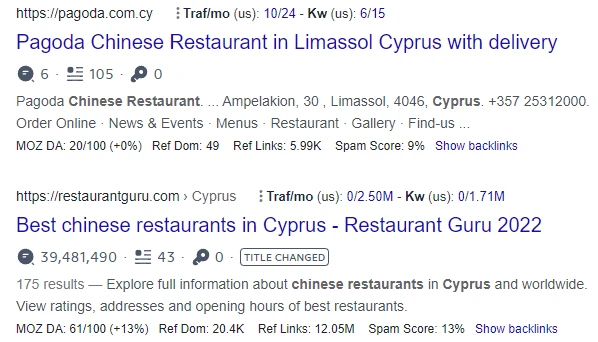
Page titles are very important, as they not only help search engines choose what to display to a searcher but will also entice searchers to click on your website, as it clearly states what they are looking for.
As a rule of thumb, keeping your titles below 65 characters would bring the most optimal results, because the full title of your page will be displayed by search engines for both desktop and mobile devices.
Displaying the geographical location can happen at the end of your title along with your keyword. Once you are finished, your page’s title should look like “Best Car Wash Services Vancouver”.
The next important thing is the slug of your page. Slugs refer to URL addresses, and the best way to optimize them is by adding the target keyword only.
Keeping slugs smaller makes them easier to read by search engines and searchers. Not to mention that they also have character limits, and get displayed next to your domain name.
The character limit of your slugs is a maximum of 30 characters. Anywhere above the cap will result in hiding your slug partially, making it unreadable.
For example, if your domain name is 10 characters in total, you have 20 characters left for a slug.
With that in mind, we can choose “Car Wash Vancouver” as our slug, which is 18 characters long and fits the capacity of 30 characters.
Headings are the next important part, bringing relevancy and quality to your page. Keyword lists can prove quite useful in such situations because every “H2”, or “H3” can be a good fit for a related keyword.

Last but not least, inserting keywords inside your content can also improve search relevancy. However, adding too many keywords overoptimizes a website, making it look like it’s trying to manipulate search results.
If that is the case with a website, Google and other search engines will not even think of ranking the pages, causing serious damage to your overall strategy.
Optimizing Image Alt Tags
Optimizing the images in your content can be a quite useful strategy, and rank your website separately for image searchers. Many business owners take this for granted, however, a study proved that many of the local searches resulted in clicks on the images section of Google, leaving fewer clicks on websites.
With that in mind, local business owners also have the chance of ranking for images, and receiving more traffic to their websites, by just providing their local business address, inside the business, and outside the business view in the form of images.
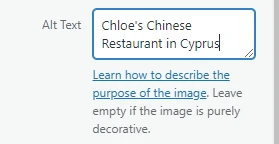
To optimize images for local search, alt tags should be prioritized, and filled with relevant keywords, which also target the location.
Alt tags can also contain the services, along with their relevant location address for even better results.
As a tip for images and alternative tags, hosting images on your website can improve the overall quality, and prevent your website from loading slower.
Claim your Google Business Profile
Setting up a Google Business profile is a part of any successful local SEO strategy. Most business owners disregard the importance of GBP, however, registering for a business profile can have many benefits.
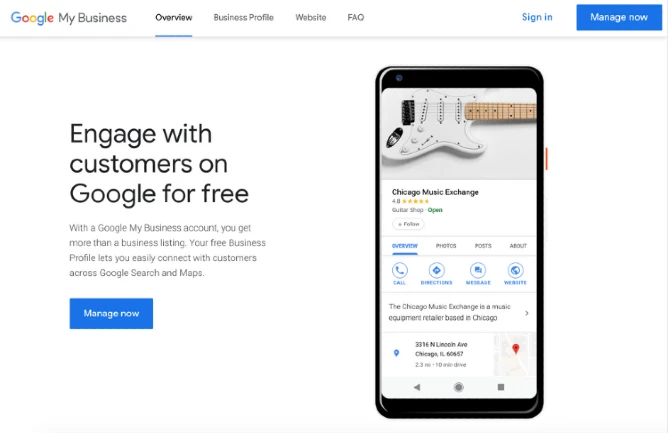
The first of these benefits is the opportunity to appear on maps and more local searches in the Google Local Pack.
Google Business Profiles also contain all the relevant information that a website holds, giving more ranking power, and trustability to visitors, and search engines.
To optimize a Google Business Profile to its fullest, a business owner is required to:
- Include the exact address of the building, which is accurate to the address placed on the website.
- Add relevant to the business building and address images, including a street view, and product or service-related images for better local SEO ranking.
- Have at least one main category, and a few service-related sub-categories, representing the business.
- A good description that describes what the business is about, and how it can solve an issue.
- Phone number and alternative contacts, which local searchers can use to get their questions answered, and problems solved.
- Offer valuable updates and promotions to your customers.
By following these simple steps, any business owner can have a big boost in the local SERPs, including a boost on their website, due to relevancy.
Create NAP Citations
NAP Citations are one of the most important link-building factors for local businesses. NAP stands for name, address, and phone.
Having that in mind, adding your business to local search directories can improve the reach of your business, making it more exposed to your target audience.
To create powerful citations, a business owner should always input the same information, without making any changes, otherwise, the relevancy will collapse, making the business look irrelevant.

Even multi-location businesses can create citations for their business by adding a special page for each of their locations, without destroying relevancy.
For a good citation, a business must include its NAP, and be relevant to the business images, just like a Google Business Profile.
Following these simple steps, when search engines crawl your local listing, they will find relevancy and give an overall boost to your Google Business Profile, and website, increasing its position in the local SERPs.
Create Social Media profiles for your business
Nowadays finding your target audience can happen easily, as you don’t need to look for them or promote content in local newspapers or similar.
That is because your target audience already exists in social media, and can be easily converted into high-paying customers.
Social media presence also helps businesses to stay relevant when searched and helps your business cover more ground with little to no effort.
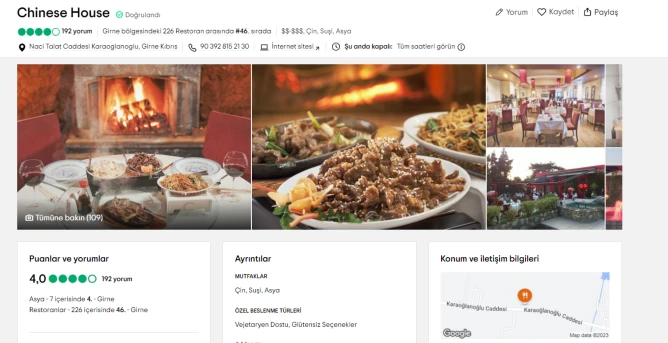
Business updates or promotions can happen easily in just a few clicks, by including image, video, or even text content.
Social media also allows business owners to build their fan base, enticing more sales, and trust in the brand.
Collect Reviews for Your Business
Most local searchers trust a brand by its reviews, and that’s not a secret. A business with no reviews is hard to trust, making conversions a tough task. There are hundreds of review websites, which can help you collect customer testimonials.
To make your local business strategy stronger, asking visitors for reviews is the best option. Even if it is a bad one, it should not be neglected.
After all, there is no perfect business, which is built with 5-star reviews only. It seems unnatural in the eyes of the customer. Search engines also see this as an unnatural factor.
The best way to collect more reviews from local customers is to send them email pitches, asking them if they liked the product or services you offered.
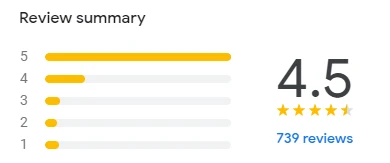
At least 21.5% of those people will open your email, and 2.3% will give you a review, as per Campaign Monitor’s research. Whether it’s good or bad, replying to the review makes you look concerned, and care about your customers.
Trying to help customers who have negative results can also be a good strategy. This way you are showing that you care about their experience, and want to make it up for them.
If the customers disagree with your resolution, this still gives an idea that you tried, and most of them will understand, and give your product or service a chance.
Build internal links
Building links is one of the most recommended ways to leverage your local SEO business strategy. By interlinking your content pieces together, you give searchers a chance to stay longer on your website, and search engines a path to follow and index you quicker.
A website built upon orphan pages stands little to no chance of getting indexed and receiving many sales.
On the other side, we have New Yorker, which offers related products, multiple categories, and more choices for their visitors, which increases the time spent on site, and chances to make a sale.
Interlinking pages should happen naturally. Every website has a few pages, which makes sense to be linked together.
However, if your website doesn’t have any relevant product pages or services that can be linked, you can easily create more content, and link these pieces together.
Start a local blog
Making a local business SEO strategy stronger can easily happen by producing quality content and linking it with all your product or service pages.
By having a blog, you are ensuring to answer all related questions in your local area and build more brand awareness with small investments.
People who read blog posts, can get interested in the services offered by a business, and make a sale, depending on the quality of the blog post.
Not to mention that a website with a blog can rank for hundreds of local keywords, strengthening the overall local SEO strategy, and giving a boost to the authority of the website. To perform a blog post, a business owner can easily conduct local keyword research and find all the questions that his local audience has. These keywords can then be given to a company, providing SEO content writing services, and get the content outsourced in a matter of time.
The results are amazing, especially when a blog needs small updates when the information becomes outdated, and investments are small, compared to the profits that a business can make.
Conclusion
While there is no promising local SEO strategy, these small tips can help business owners grow their digital visibility, by ranking in the SERPs and collecting more traffic.
Local SEO involves many different factors from technical, on-page, and off-page SEO activities, which may require a professional to perform, for better local search results.
If you are a beginner who is seeking professional help to find your target audience and rank for local keywords, you can get familiar with how much local SEO costs and reach out to an agency for services.
